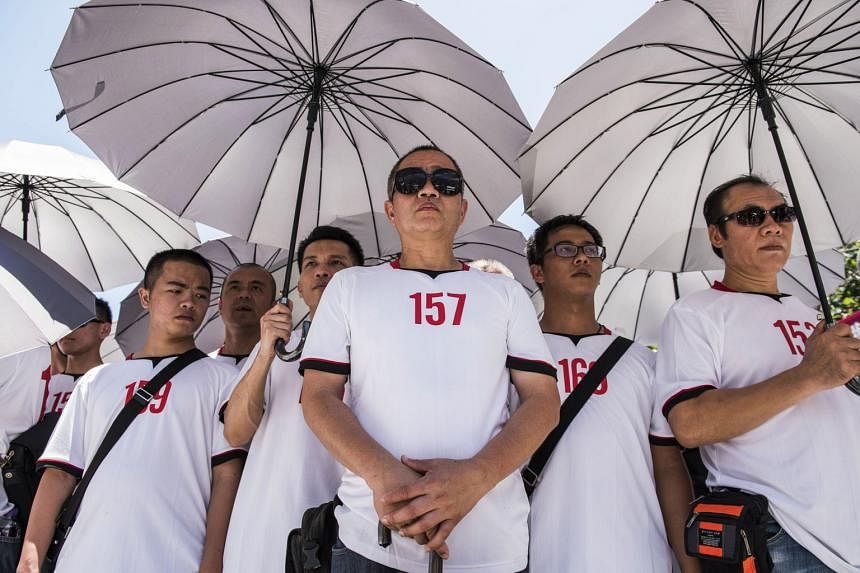BEIJING - China's Foreign Ministry and state media lashed out at Hong Kong's opposition pro-democracy lawmakers after the legislature in the financial hub vetoed a Beijing-backed electoral reform package.
"Certain people, whose aim was to hobble the development of democracy in Hong Kong, voted against the Bill in the legislature," Foreign Ministry spokesman Hong Lei told reporters. "They will bear the responsibility of history for this."
-
Road to universal suffrage
-
June 10, 2014: Beijing issues Hong Kong White Paper condemned by democracy campaigners.
June 30: 800,000 people vote in favour of greater democratic freedoms in an unofficial referendum organised by the protest group Occupy Central.
Aug 31: China insists on its right to vet candidates for Hong Kong's next leadership election in 2017. In response, Occupy Central and other groups vow to embark on an "era of civil disobedience".
Sept 22: University students begin boycotting classes.
Sept 28: Occupy Central joins students, announcing it has begun civil disobedience campaign. Clashes ensue.
Oct 3: Student leaders agree to Hong Kong leader Leung Chun Ying's offer of talks. But they are called off after rallies get increasingly ugly.
Nov 18: Protesters attempt to storm Parliament, sparking clashes, as court-ordered clearances get under way.
Dec 11: Hong Kong police dismantle city's main protest site, hauling off protesters.
April 22, 2015: Hong Kong announces a roadmap for the leadership election.
May 31: Pro-democracy lawmakers say they will veto the government's proposal.
June 15: Police arrest 10 people involved in making explosives.
June 17: Lawmakers begin debating reform package in the legislative assembly.
June 18: The reform package is rejected, with just eight lawmakers supporting the proposal and 28 against it.
AGENCE FRANCE-PRESSE
The Chinese Communist Party's official People's Daily newspaper stated in a commentary in its overseas edition: "The conduct and deeds of the opposition faction show that they are disturbers and destroyers in the process of the democratisation of Hong Kong."
Referring to the 28 lawmakers who voted against the proposal, it wrote: "The goal of their veto of the universal suffrage Bill is to contest the governance of Hong Kong by the central government, conspiring to turn Hong Kong into an independent political entity."
The rejection was a rare instance of the former British colony voting heavily against a proposal endorsed by China's central legislature. The largely rubber-stamp regional legislatures around China would likely never reject an order from Beijing to pass a Bill, so the veto is both a setback and an embarrassment for the ruling Communist Party.
Hong Kong's pro-democracy opposition calls Beijing's proposal a "fake" democratic model.
"All those who voted against the blueprint might be cocky today, but they will face the judgment of history and shoulder the responsibility eventually," The Global Times tabloid, published by the People's Daily, said in an editorial in its English edition. "We are concerned that a Pandora's box is being opened in Hong Kong and various devils are released to ruin the region's future," it said, warning that Hong Kong could "degenerate from the capital of finance and fashion to a total mess".
The South China Morning Post opined in an editorial that government officials, pan-democrats and the pro-establishment camp, despite failing to agree on how Hong Kong should proceed on political reforms, agree that all will lose out as a result.
Chief Secretary Carrie Lam had warned in April that the Bill's rejection would divide the city further and adversely affect governance.
Meanwhile, Chief Executive Leung Chun Ying said he would bring a series of economic initiatives to lawmakers next week, after economists warned that business in the Asian financial hub could be undermined by the veto. He said that Democratic lawmakers' filibustering of all Budget items during the pro-democracy protests would hurt the community if they continued. "It's time for all of us to move on," he said. "We should try to forge consensus on various economic and livelihood issues."
REUTERS

